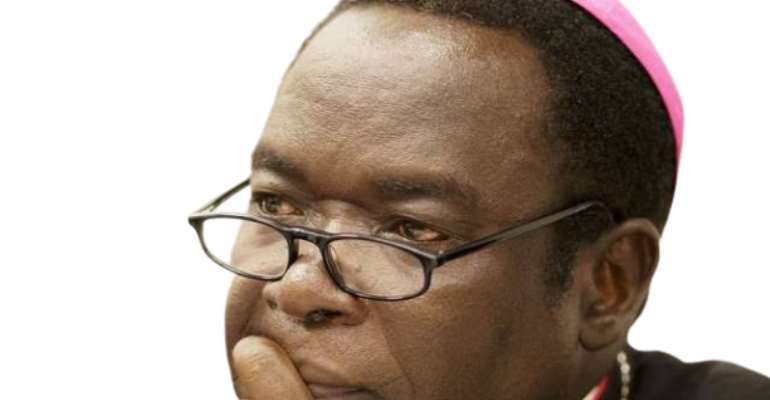Kukah’s Critics, The Elephant And Relativism-Absolutism Debate

There is no denying the fact that most of us had at one time or the other, predictably during participation in Tales-by-Moonlight; which was the in-thing across families in the 70s and early 80s, being entertained by the elders with the story of the blind men and the elephant. As narrated by some of us that were old enough to hear the story, five blind men were brought up to different parts of an elephant and asked to describe it. The one, who touched its ears, said the elephant was like a gigantic fan. The one who touched the trunk said the elephant was like a hose. The one who touched the foot said the elephant was like a tree trunk. The one who felt the tusk said the elephant was like a hard smooth stick. The one who touched the tail said the elephant was like a gigantic rope.
Now, if a Relativist would be asked to tell this story, he might in his imagination see the blind men as screaming at one another, “You are wrong, an elephant is not like what you say, he is like what I say.” “These blind men," says the Relativist, "are like absolutists, who think that the truth is just one thing. But, "says the Relativist, "the truth here is obviously many things, one thing to one person, and one thing to another. The elephant is perceived differently by the different blind men and they are all equally right. There is no single truth independent of perception."
The intelligent absolutist, however, says, "Not so fast. Maybe these blind men are equally right as you say, but they are not talking about the same part of the elephant. And they are certainly wrong if they believe that they have adequately described the elephant as a whole. But someone who is not blind realizes that the elephant has several parts. What's more, the blind person who slides his hands from one part of the elephant anatomy to the others would himself realize the incompleteness of his first description.
"My point," says the Absolutist, "is that there are better and worse descriptions of the elephant. The description that mentions the different parts as well as how they are put together is better and closer to the truth than the partial truths with which the blind men started. There are objective facts about elephants, and the views that describe more of those objective facts are truer views. Not all views are equal."
At this juncture, it is expedient to say in this context that a Relativist is anyone that believes that there is no absolute truth. Rather, he thinks different people can have different views about an issue, particularly when it is a moral issue. However, for the sake of understanding the issue in this context, it is expedient to say that it is not about moral and immoral issue but about perception or understanding of how the elephant looks like. On the other hand, in as much as an Absolutist is more political in meaning than in this context, it is pragmatic to say that an Absolutist is someone who believes that someone’s opinion on an issue can be sacrosanct and absolute.
Analyzed from a similar perspective, it would be recalled that in a mass communication class that a lecturer wrote on a piece of paper and passed it round for the students to interpret or explain to his hearing; only for a huge spectrum of the class population to give different interpretations to what he wrote. Without doubt, this classroom experience will remind anyone with how the now dubbed controversial Christmas message of the Catholic Bishop of Sokoto Diocese, Bishop Matthew Hassan Kukah, in which he criticized President Muhammadu Buhari’s administration has being misinterpreted by his critics . It is not an exaggeration to say that the message has continued to generate plethora of reactions since it was delivered to his congregates from different quarters. Without taking side, party, religion or tribe affiliations are in one way or the other fueling the criticisms that has been trailing the cleric since he delivered the message. To many, his critics appear not to be dispassionate. To my view, Kukah’s message can be likened to that Elephant which the blind men interpreted from different point of understanding.
Without saying much about Kukah’s homily, it is instructive enough to say that the cleric merely spoke the truth to power even as his view has earlier being shared by other eminent Nigerians and international observers. We should not miss the point that criticism is "the expression of disapproval of someone or something based on perceived faults or mistakes." Against the foregoing backdrop, Kukah’s message should not be seen through the eyes of one-sidedness like the Absolutist. The government should not be ignorant of the fact that an administration that operates without been criticized cannot be said to be a democratic but a theocratic, dictatorial or a totalitarian government. If I may ask, can anyone in posterity be proud to beat his or her chest that he was part of the government that would be described as such? To me, the government should accommodate criticisms, and try as much as possible to manage any view that tend to misconceive its activity.
The government should also understand that the ability to criticize is also known as free speech, which is paramount in any society that is open and progressive to the idea that freedom is contingent on the idea that the individual must be free to express, not only criticisms of government, but of society in general. To ban critical words is to ban critical thinking. It will no doubt lead to a situation where speech, thought and action are controlled the government.
